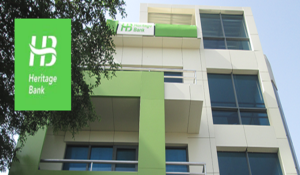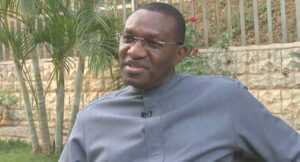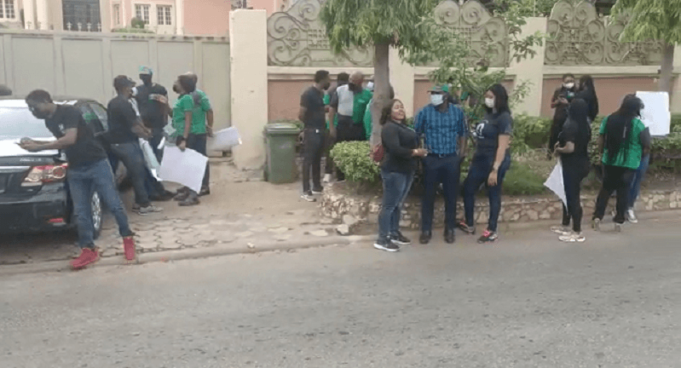When the now-viral video of some staff members of Heritage Bank protesting at the house of a supposed debtor first surfaced online recently, many took it with a pinch of salt. This was in spite of the narration that accompanied the video, stating that Senator Andy Ubah had been owing the banks for years and they were at his house to appeal to him to pay up, else many of them would lose their jobs.
The sceptism about the authenticity of the video was not unfounded. For one, Nigerian banks are not known to go about debt recovery in such a manner, not even from a prominent politician. Secondly, social media has on many occasions proven to be a veritable source of ‘fake news’. Again, initial attempts by the conventional media to authenticate the video from spokesperson of the bank had proven abortive as they denied knowledge of such action.
However, the Chief Executive Officer of the Bank, Ifie Sekibo, cleared all doubts about the video through a message circulated to all staff of the Bank. In the memo, the Heritage Bank’s helmsman explained that the bank did not deliberately put the staff’s action on social media but the development was part of the bank’s effort to prioritise the recovery of all its outstanding loans.
Sekibo stated: “Consequently, the recent visit of our colleagues was in line with our objective and solely to address the indebtedness of the customer.
“I encourage us all to be bold and tenacious, fiercely engaging the market and refusing all forms of intimidation, which the current phase may present.”
In the video, which was widely circulated over some social media platforms on Monday, one of the staff members of the bank, whose voice was captured in the video, said, “We are at the Abuja residence of Senator Andy Ubah for a peaceful meeting because he has been owing the bank for a couple of years now.
“We are here to ask him to kindly repay the loans, which are depositors’ funds. If the loan is not refunded, it will throw the staff of the bank out of job, which will affect their families.”

Unanswered question
With the official confirmation of the action, which obviously, was strongly supported and encouraged by its management, Heritage Bank has opened a new vista in debt recovery processes in the Nigerian banking sector.
The question many stakeholders are asking, however, is what happens to the collateral upon which the loan was granted?
Although the amount of the loan in question has neither been disclosed by the bank nor the defaulter, analysts say for the bank to have sent out a retinue of his staff to the Senator’s house, it must be a quite significant amount, which by normal banking standard should be secured.
According to the Central Bank of Nigeria (CBN), a secured loan is a loan in which the borrower pledges assets (e.g. property, movable assets, etc.) as collateral (guarantee) for the loan. The assets are always worth more than the amount of the loan and can be claimed by the lender if the borrower does not pay back the money according to agreed terms and conditions.
However, financial analysts said the Heritage Bank vs. Senator Andy Ubah’s issue may be an example of the rampant cases of unsecured loans in the banking industry, usually granted on the basis of the borrowers’ connections with the banks’ management.
Lamenting about the plight of small businesses in securing bank loans while the ‘big men’ get a loan without stress, a financial analyst said, “sincere and hardworking owners of small but growing businesses approached you for a loan, after asking him to bring all the documents and collaterals in the world and they couldn’t, you denied them access to finance.
“On the other hands, a big politician perhaps, sat in a club with you, with both of you sipping champagne and listening to cool music and also doing every other thing they do under such atmosphere. The politician told you he needed loan for whatever which includes some frivolities, you even laughed over it. Because of his name and status, you even went ahead, telling him how to write the letter and apply, you used your influence to waive critical conditions. You didn’t ask him for adequate collaterals as cover and pronto! The loan was granted. Now, the politician has chosen to default.”
He added that cases such as these are contributing to the increasing bad debt portfolio of banks in Nigeria.
CBN’s debt recovery policy
To reduce non-performing loans (NPLs), and promote watch-listing of chronic loan defaulters in the Nigerian banking system, the CBN had last year introduced the Global Standing Instruction (GSI). The policy, introduced by the CBN by virtue of Section 2 (d) of the CBN Act, 2007, and approved by the Banker’s Committee on February 18, 2020, is to promote a sound financial system and enhance loan recovery across the Nigerian banking sector.
Under the GSI, it is no longer possible for a bank customer to take a loan or credit from one bank and refuse to pay back, while continuing to maintain several other accounts in other banks with enough credit balance that could have paid back the debt of the first bank.
For instance, with the policy, if a bank customer or account holder is granted a loan or credit by a bank (say GTB), and defaults in paying back when the facility becomes due in line with the agreed GSI repayment mandate, GTB can contact any other bank(s) in the country where the defaulting customer holds an account(s) with credit balance that is enough to offset the full value of the loan or credit and recover the loan or credit from there.
This means that if a customer takes a loan or credit from GTB and defaults in repaying according to agreed repayment schedule, GTB can contact Zenith Bank, Access Bank and First Bank, if the customer has accounts with sufficient credit balances in those banks and the accounts are linked by his or her bank verification number (BVN), to recover the full value of the loan or credit without any further recourse to the defaulting customer.

In defense of Ubah
Meanwhile, a coalition of civil society organisations (CCSOs) has risen in defense of the loan-defaulting Senator.
The group in an address read by its President, Etuk Bassey Williams and secretary-general of the coalition, Abubakar Ibrahim, at a press conference in Abuja, alleged that the bank has gotten itself involved in “politics” knowing that Senator Ubah is contesting in the forthcoming governorship primary election of All Progressives Congress (APC) this weekend in Anambra State and described the staged protest at Ubah’s residence by the staff of the bank as blackmail.
“We, as Coalition of Civil Society Group frown at this blackmail tendency of Heritage Bank and call on relevant agencies to look into it and bring them to book. Banks should always adhere to the oath of secrecy that exists between them and their customers. Turning to agents’ provocateur in the hands of political enemies of Sen. Andy Ubah is disheartening for a bank.
“We condemn this shameless act under any disguise and hereby warn all detractors that their plot has failed….
“We are not saying money owed shouldn’t be paid back, but due process and laid down procedures should be followed in requesting for loan repayment not resorting to street protest like gangsters. This plot has failed and the bank has also failed along with their collaborators,” the coalition said.
Conclusion
While Heritage Bank has succeeded in bringing the loan saga into the public arena through its unorthodox recovery move, the expected result in terms of payment by the defaulter is yet to be seen. Again, it is still unclear why the bank has chosen this route rather than activating the GIS policy on the Senator’s account.
- Ijaw youths raise the alarm: Oil thieves after Kyari, Tompolo, Otuaro - December 22, 2024
- Abuja stampede: Wike commiserates with victims, directs free treatment - December 21, 2024
- Uba Sani Signs Executive Order, raises academics’ retirement age to 65 - December 20, 2024










